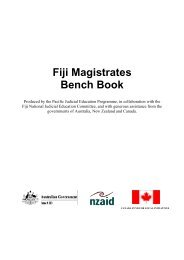Tuvalu Island Courts Bench Book - Federal Court of Australia
Tuvalu Island Courts Bench Book - Federal Court of Australia
Tuvalu Island Courts Bench Book - Federal Court of Australia
You also want an ePaper? Increase the reach of your titles
YUMPU automatically turns print PDFs into web optimized ePapers that Google loves.
1 The Constitutional Framework <strong>of</strong> <strong>Tuvalu</strong><br />
1.1 <strong>Tuvalu</strong>’s Constitution<br />
The 1986 Constitution and the Laws <strong>of</strong> <strong>Tuvalu</strong> Act 1987 state that:<br />
• the Constitution is the supreme law <strong>of</strong> <strong>Tuvalu</strong>;<br />
• any other law that is inconsistent with the Constitution is invalid, either in whole or in<br />
part to the extent <strong>of</strong> the inconsistency; and<br />
• all other laws are to be interpreted and applied subject to the Constitution and, as far as<br />
practicable, in such a way as to conform with the Constitution.<br />
The Constitution details the basic elements <strong>of</strong> <strong>Tuvalu</strong>’s system <strong>of</strong> government by defining:<br />
• fundamental human rights;<br />
• the organisation and structure <strong>of</strong> the legal system; and<br />
• the roles, responsibilities and powers <strong>of</strong> the Executive, Parliament and the Judiciary.<br />
The Constitution is based on and gives effect to the doctrine <strong>of</strong> the Separation <strong>of</strong> Powers.<br />
The doctrine <strong>of</strong> the separation <strong>of</strong> powers<br />
This doctrine states that there should be three distinct and separate branches <strong>of</strong> government:<br />
1. the Executive: administrator and policy maker;<br />
2. the Parliament (Legislature): law maker; and<br />
3. the Judiciary: interpreter <strong>of</strong> law.<br />
Each branch <strong>of</strong> government checks the roles and functions <strong>of</strong> the other branches. This checking<br />
maintains the balance <strong>of</strong> power between the three branches and does not allow the Executive to<br />
gain too much power. See Kamuta Latasi v R, ex parte Attorney-General (High <strong>Court</strong> 3/02) and<br />
Kamuta Latasi v Attorney-General (High <strong>Court</strong> 1/03), where the High <strong>Court</strong> ruled that Cabinet<br />
(the Executive) had acted unconstitutionally and ultra vires (outside the law) in making certain<br />
appointments and directives.<br />
The independence <strong>of</strong> the Judiciary is an important element <strong>of</strong> the doctrine <strong>of</strong> Separation <strong>of</strong><br />
Powers and is vital for maintaining the balance <strong>of</strong> power.<br />
Independence <strong>of</strong> the Judiciary<br />
Although Parliament makes laws and the Executive allocate funds, premises, supporting staff<br />
and services for the Judiciary, nevertheless the Judiciary must be independent and free from all<br />
political or other influence in carrying out its duties in making decisions.<br />
<strong>Tuvalu</strong> <strong>Island</strong> <strong><strong>Court</strong>s</strong> <strong>Bench</strong> <strong>Book</strong> June 2004
















